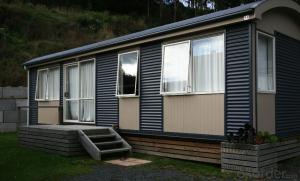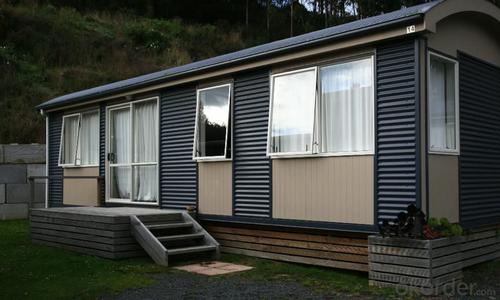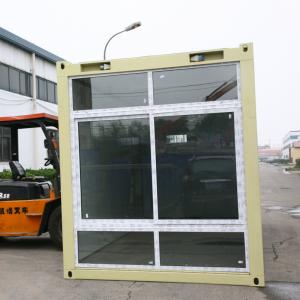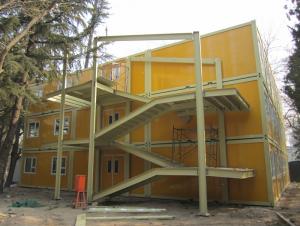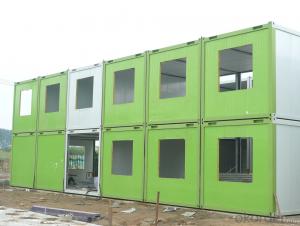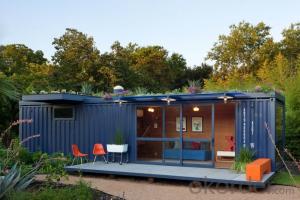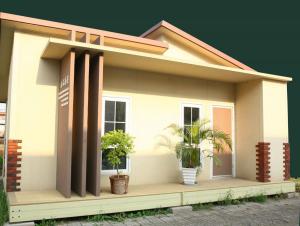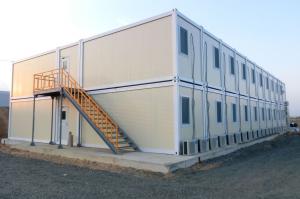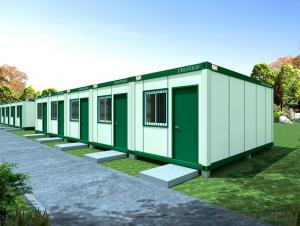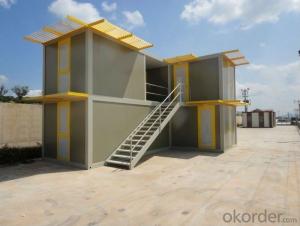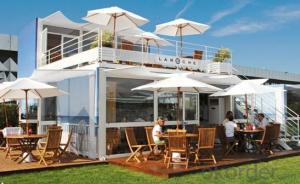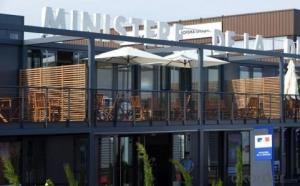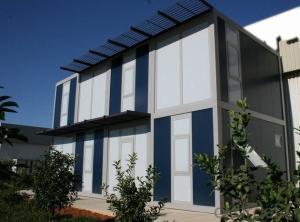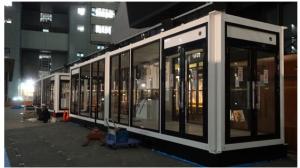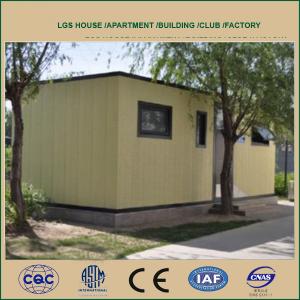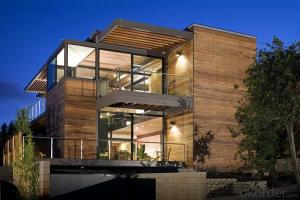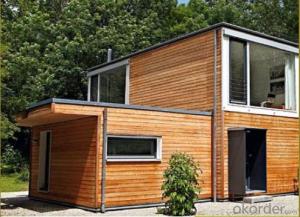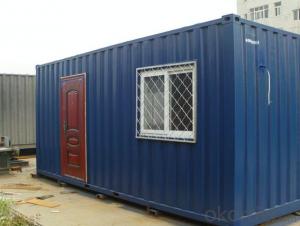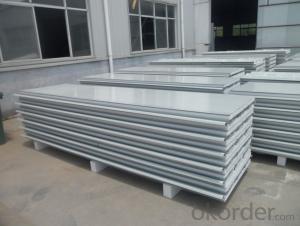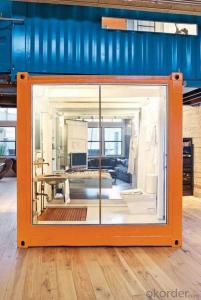Luxury Decorated Container House
- Loading Port:
- Tianjin
- Payment Terms:
- TT OR LC
- Min Order Qty:
- -
- Supply Capability:
- 1000 sets unit/month
OKorder Service Pledge
OKorder Financial Service
You Might Also Like
Luxury Decorated Container House
Description
The container house is movable as a whole unity. This kind of container house is reusable usually as offices in domestic areas other than as habitable houses. Using a kind of 1150 modulus design, with security nets, doors and floor tile, its firm and safe. Cabinet unit structure for the introduction of steel and cold-formed steel welded together to make up standard components. The house can be designed just as just one unit or connected to a whole from several boxes, by simple connection such as bolts. Easy to assemble.
Container house has a wide range of applications. It can be used in temporary construction site, commercial industry, civil, military and other fields.
Technical Parameters
1).Designed and developed according to the standard size of shipping container;
2).Heatproof and waterproof;
3).Widely used as office, meeting room, dormitory, shop, booth, toilet, storage, kitchen, shower room, etc.
4).Size: 6058 * 2435 * 2790mm;
5).Components: adopts EPS, PU, or rock wool as heat insulation material;
6).All the components of the container house are up to standard and prefabricated with the advantage of easy installation and uninstallation.
7).Easy assembly and disassembly: Only six skilled workers are needed to finish three modular units in 8 hours;
8).One 40ft HQ container can load six sets of 5,950 x 2,310 x 2,740mm standard units or six sets of 6,055 x 2,435 x 2,740mm standard units;
9).The standard unit can be connected together at any direction or stack up to two or three stories;
10).Waterproof design of structure, fireproof, and heat insulation of material ensure the house to resist heavy wind load of 1.5kN/m2 and 7° seismic intensity;
11).Lifespan of the house: 20 to 25 years.
Advantage & Basic Design
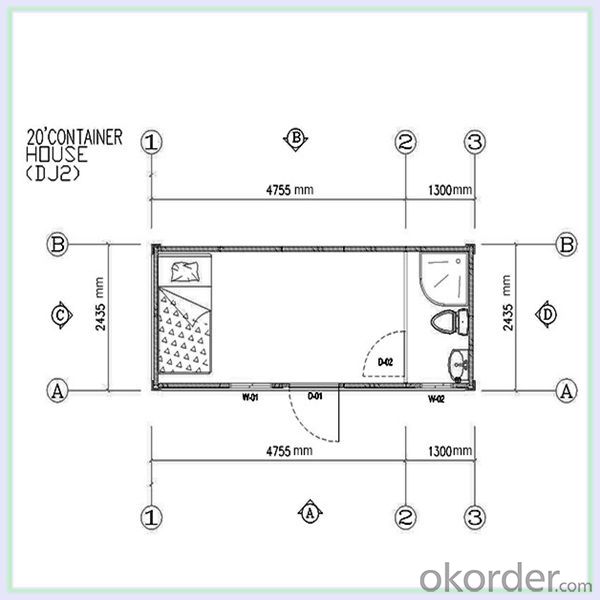
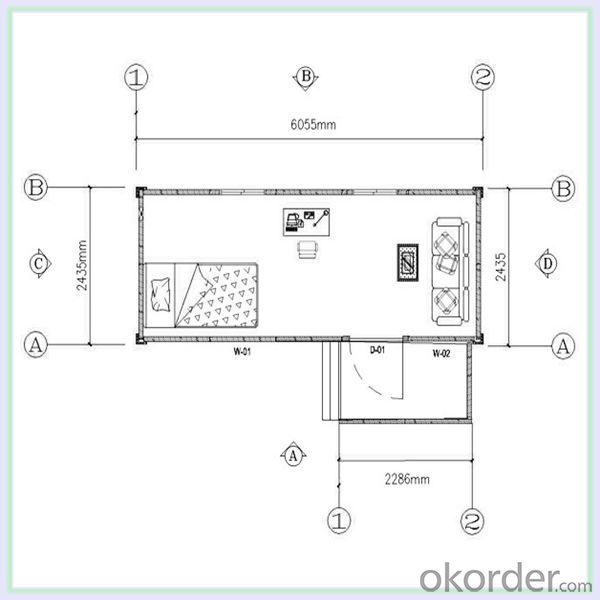
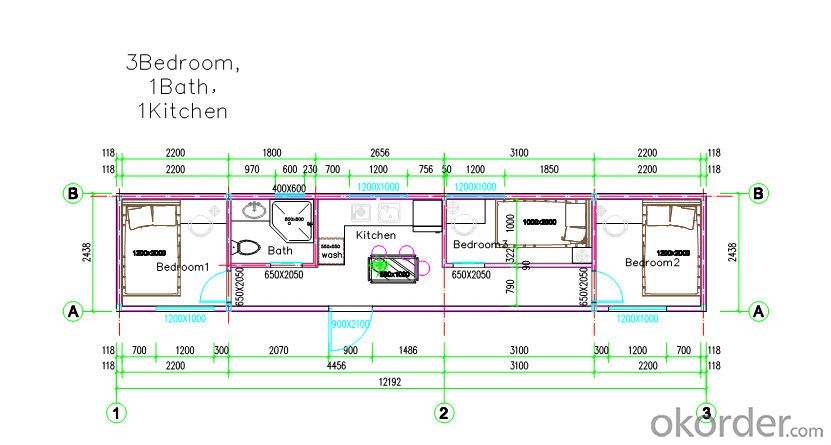
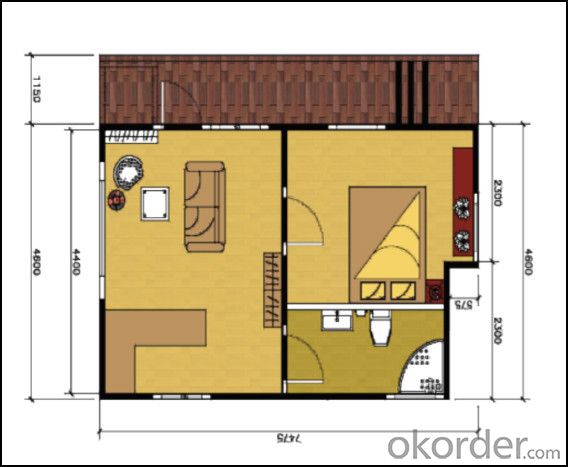
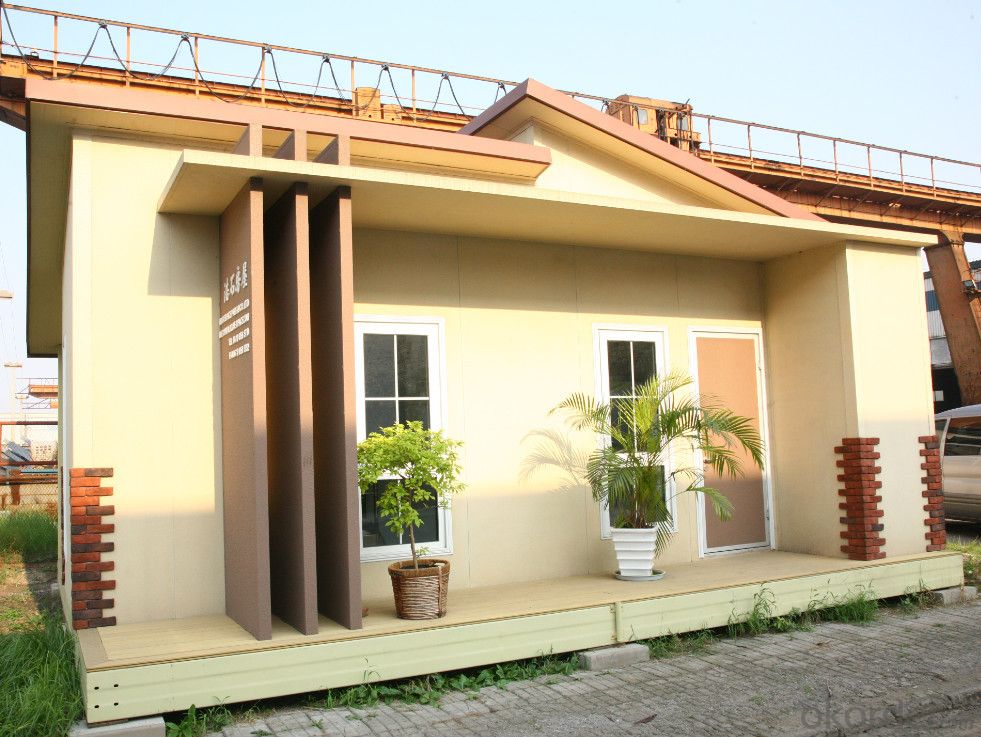
| Construction Efficiency | 2 worker in one day for one unit |
| Long life time | Max. 20 years |
| Roof load | 0.5KN/sqm (can reinforce the structure as required) |
| Wind speed | designing wind speed: 210km/h (Chinese standard) |
| Seismic resistance | magnitudes 8 |
| Temperature | suitable temperature.-50°C~+50°C |
Factory & Shippment
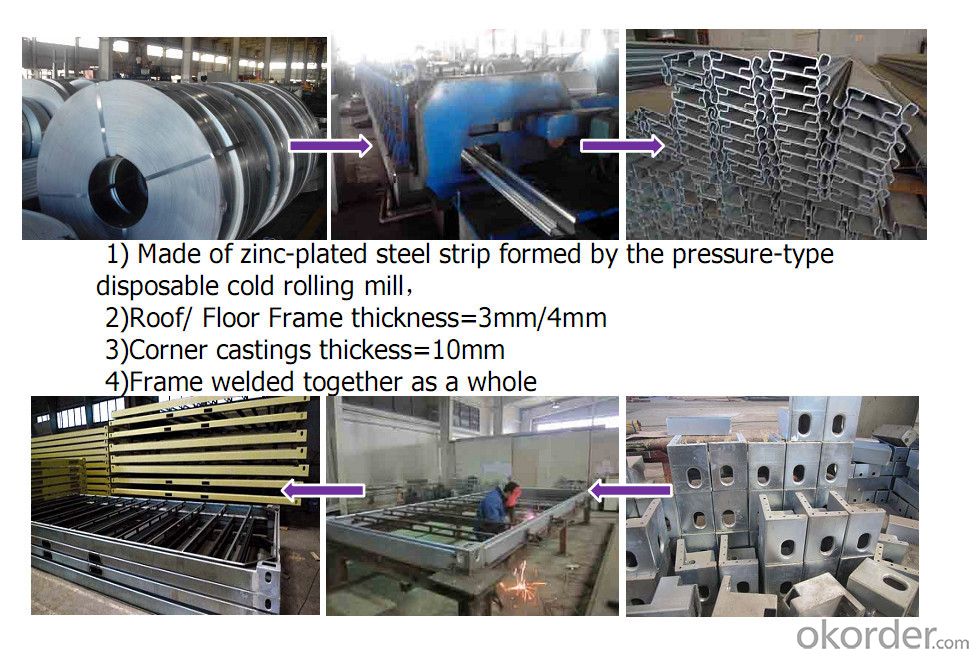
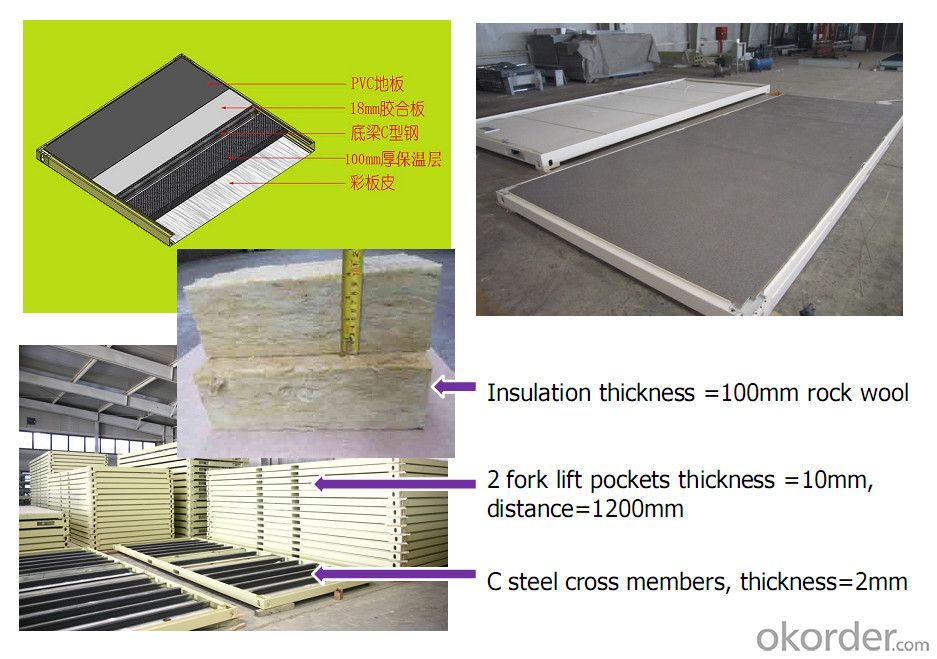
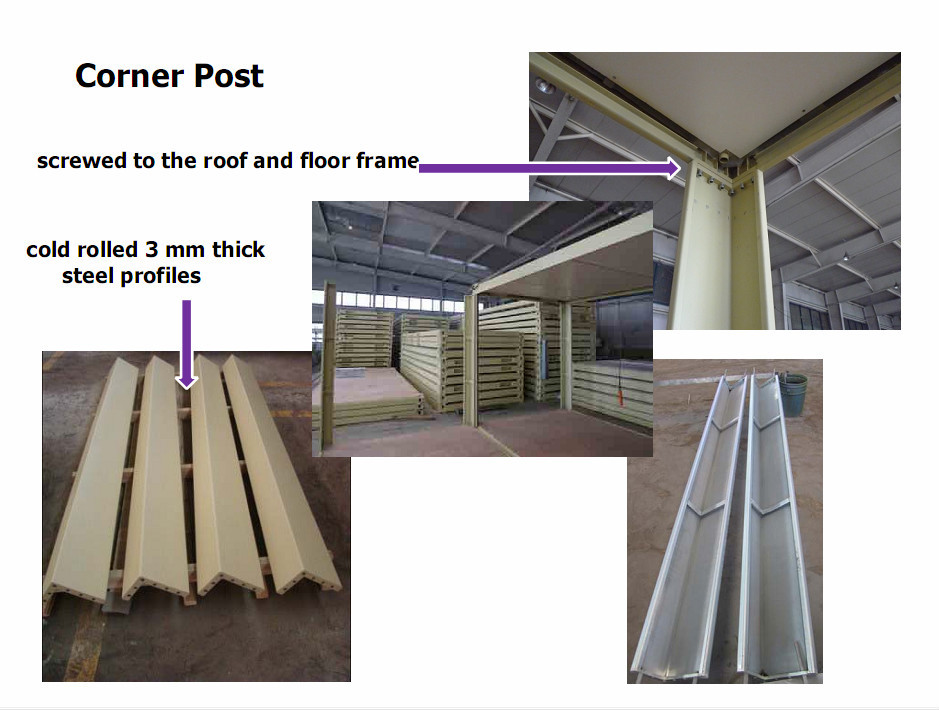
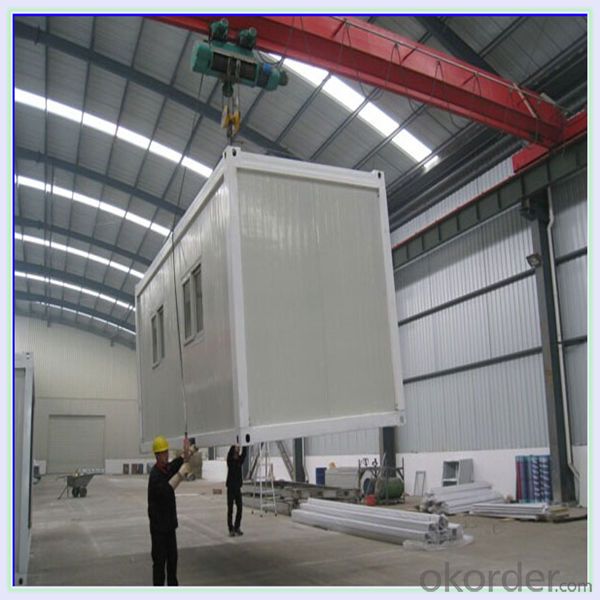
Application
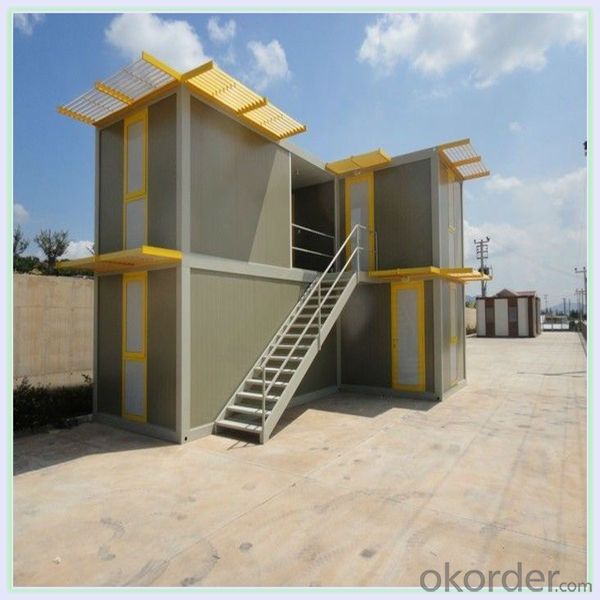
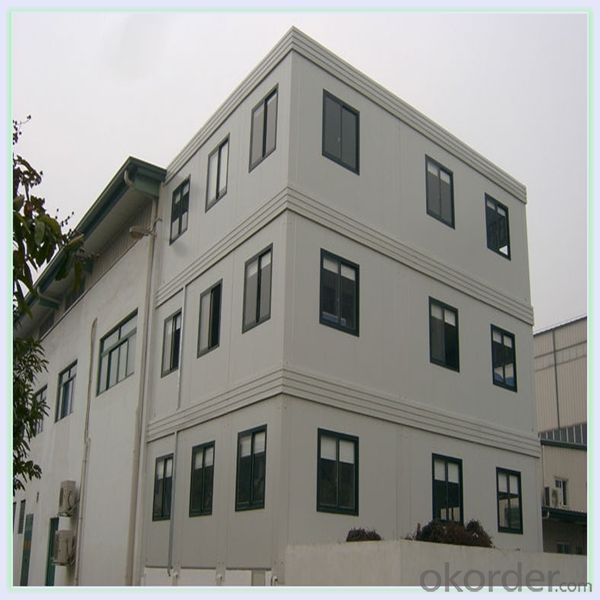
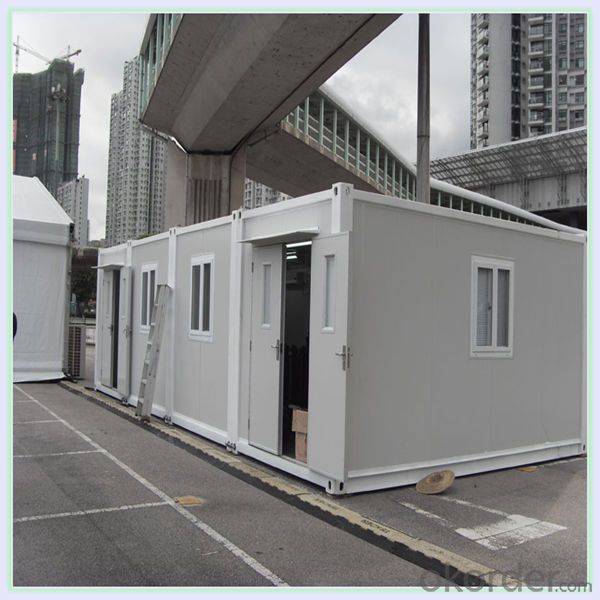
- Q: Are container houses suitable for small business offices?
- Indeed, container houses prove to be a viable choice for small business offices. They present various advantages that render them suitable for such purposes. To start with, container houses offer a cost-effective solution. Compared to conventional office spaces, their construction and maintenance costs are significantly lower. This proves particularly advantageous for small businesses operating on limited budgets, enabling them to save substantial amounts of money on rent and construction expenses. Moreover, container houses boast high levels of customization. They can be easily modified and tailored to meet the specific needs and requirements of small business offices. Containers can be stacked or interconnected to create larger office spaces, complete with all the necessary amenities, including electricity, plumbing, heating, and air conditioning. Additionally, container houses exhibit portability and flexibility. They can be effortlessly transported to different locations, making them an ideal choice for small businesses that frequently change their office space or operate in multiple areas. This mobility also allows for future expansion or downsizing, depending on the evolving needs of the business. Furthermore, container houses contribute to environmental preservation. By repurposing shipping containers, we can reduce waste and promote sustainability. This serves as a crucial consideration for small businesses aiming to adopt environmentally friendly practices and minimize their carbon footprint. Nevertheless, it is important to acknowledge certain limitations of container houses. The limited space available within a container may not be suitable for businesses requiring extensive office areas or accommodating a significant number of employees. Additionally, container houses may not align with the needs of businesses seeking a more professional or upscale image. In conclusion, container houses offer a suitable alternative for small business offices, providing cost-effectiveness, customization, portability, and eco-friendliness. Nevertheless, it is imperative to thoroughly evaluate the specific needs and requirements of the business before opting for container houses as office spaces.
- Q: Can container houses withstand extreme weather conditions?
- Yes, container houses can withstand extreme weather conditions. Due to their sturdy steel structure, they are designed to be durable and resistant to harsh weather, including strong winds, heavy rains, and even earthquakes. Additionally, proper insulation and reinforcement can be added to further enhance their ability to withstand extreme weather conditions.
- Q: Are container houses resistant to earthquakes?
- Container houses are widely regarded as being able to withstand earthquakes. The inherent strength and durability of shipping containers, thanks to their structural integrity, allows them to resist external forces, including seismic activity. Typically constructed from steel, a highly robust and flexible material, these containers possess the ability to absorb and distribute earthquake energy. Furthermore, their earthquake resistance can be enhanced by bolstering them with additional steel supports or bracing. However, it is important to bear in mind that the degree of earthquake resistance can vary depending on factors such as design, construction, and location. To ensure proper resistance to seismic forces, it is crucial to obtain professional engineering evaluations and adhere to local building codes and regulations during the design and construction of container houses.
- Q: Are container houses suitable for small businesses or offices?
- Container houses are a practical choice for small businesses and offices. Their adaptability allows them to be tailored to the specific requirements of a small business or office. Compared to traditional brick and mortar buildings, container houses are a cost-effective option, making them appealing to startups or businesses with limited budgets. Moreover, container houses provide mobility, easily being transported to different locations. This flexibility is advantageous for businesses that may need to relocate. Additionally, container houses can be swiftly set up, enabling businesses to commence operations in a shorter timeframe than constructing a conventional building. These structures can be modified to include essential amenities for small businesses or offices, such as insulation, plumbing, electricity, and HVAC systems. They can also be designed with separate rooms or areas to accommodate various functions, such as meeting rooms, workstations, or storage spaces. Furthermore, container houses demonstrate environmental consciousness as they are repurposed from shipping containers, reducing waste and promoting sustainable construction practices. They can also incorporate energy-efficient features, like solar panels or rainwater harvesting systems. To sum up, container houses offer an attractive solution for small businesses and offices, providing affordability, flexibility, and customization options. They are suitable for startups, remote locations, temporary offices, or businesses seeking an alternative and sustainable building choice.
- Q: Are container houses susceptible to rust or corrosion?
- Container houses are typically made from steel shipping containers, which are designed to withstand the harsh conditions of long-distance transportation at sea. These containers are typically made from weathering steel or corten steel, which is known for its high resistance to corrosion. While container houses are generally resistant to rust and corrosion, it is important to note that they are not entirely immune to it. Over time, if the containers are not properly maintained or exposed to certain environmental factors, rust and corrosion may occur. Factors that can contribute to rust and corrosion in container houses include exposure to moisture, salty air, and extreme weather conditions. If the containers are not properly sealed, water can seep into the structure, leading to rust formation. Additionally, if the paint or protective coatings on the containers are damaged or worn out, corrosion may occur. To mitigate the risk of rust and corrosion in container houses, regular maintenance is essential. This includes inspecting the containers for any signs of damage or wear, repairing any cracks or holes, and applying protective coatings or paint as necessary. Properly sealing the containers and ensuring proper ventilation can also help prevent moisture buildup and reduce the risk of rust. In conclusion, while container houses are generally resistant to rust and corrosion, they are not completely immune to it. With proper maintenance and care, the risk of rust and corrosion can be minimized, ensuring the longevity and durability of the container house.
- Q: Are container houses safe and secure?
- Yes, container houses can be safe and secure. When properly designed and constructed, container houses can offer the same level of safety and security as traditional houses. They are built to withstand extreme weather conditions and can be fortified against potential threats. Additionally, container houses can incorporate various safety features such as fire-resistant materials, secure locks, and alarm systems to enhance security.
- Q: Are container houses suitable for areas with limited access to utilities?
- Yes, container houses can be suitable for areas with limited access to utilities. One of the advantages of container houses is their flexibility in terms of design and construction. They can be easily modified and customized to meet specific needs, including the integration of alternative energy sources and off-grid systems. In areas with limited access to utilities such as electricity, water, or sewer systems, container houses can incorporate solar panels, wind turbines, and rainwater harvesting systems. These alternative energy sources can provide electricity for lighting, heating, and appliances, allowing the house to operate independently from the grid. Furthermore, container houses can be designed to have self-contained waste management systems, including composting toilets or septic tanks. This allows for proper sanitation and waste disposal even in areas without a sewage system. The modular nature of container houses also makes them suitable for transportation to remote locations. They can be easily transported by truck, ship, or even helicopter if needed. This means that container houses can be delivered to areas with limited road access, enabling people to have a comfortable and sustainable living space even in remote or isolated locations. Overall, container houses offer great potential for areas with limited access to utilities. They provide the opportunity to create affordable and sustainable housing solutions that can function independently from traditional infrastructure.
- Q: Can container houses be designed to have a home gym?
- Yes, container houses can certainly be designed to have a home gym. The versatility and flexibility of container houses make them excellent options for incorporating various amenities, including a home gym. With careful planning and design, it is possible to create a functional and comfortable workout space within a container house. To begin with, the size of the container can be customized to accommodate the desired gym equipment and layout. Containers can be combined or modified to create larger spaces, allowing for a spacious gym area. Additionally, the container's interior can be altered to include necessary features such as proper ventilation, insulation, and adequate lighting to create a comfortable exercise environment. Furthermore, container houses can be designed with large windows or skylights to allow for natural light, creating a more inviting and energizing atmosphere. Additionally, the container's exterior can be modified to include a covered outdoor area or a rooftop deck, providing additional space for outdoor workouts or relaxation. When it comes to equipment, there are numerous options that can be installed in a container home gym. From cardio machines like treadmills or stationary bikes to weightlifting equipment such as dumbbells or weight benches, there are various choices depending on personal fitness preferences and goals. Wall-mounted mirrors and proper flooring can also be included to enhance the functionality and aesthetics of the gym space. Lastly, it is important to consider the electrical and plumbing requirements for a home gym in a container house. Adequate electrical outlets and wiring should be installed to support the gym equipment and any multimedia devices such as TVs or speakers. Plumbing may also be necessary if there is a need for showers or bathrooms within the gym area. In conclusion, container houses can be creatively designed and customized to include a home gym. With careful planning, consideration of space requirements, and the incorporation of necessary features, it is possible to create a functional and enjoyable workout space within a container house.
- Q: Can container houses be insulated for energy efficiency?
- Absolutely, container houses can be insulated to improve energy efficiency. In fact, insulation plays a crucial role in transforming container houses into cozy and eco-friendly living spaces. There are various insulation choices available for container houses, such as spray foam insulation, rigid foam insulation, and insulation panels. When it comes to container houses, spray foam insulation is a highly favored option due to its exceptional insulating properties and ability to create an airtight seal, effectively preventing drafts and air leakage. It is directly applied to the container's interior walls and ceilings, forming a protective barrier that helps regulate indoor temperatures and minimize energy usage. Another alternative is using lightweight and durable rigid foam insulation boards that can be installed on either the interior or exterior of the container walls. These boards possess excellent insulation capabilities, effectively preventing heat transfer and maintaining a comfortable indoor temperature. Insulation panels made from materials like fiberglass or mineral wool can also be employed to insulate container houses. These panels are easy to install and offer solid thermal insulation, reducing the reliance on heating and cooling systems and ultimately saving energy. Furthermore, it is essential to consider insulating the roof and flooring of the container house. Insulating the roof prevents heat gain or loss through the top of the house, while insulating the flooring helps maintain a comfortable indoor temperature and minimizes heat transfer from the ground. By insulating container houses, you can significantly enhance energy efficiency, lower heating and cooling expenses, and create a pleasant living environment. It is advisable to consult professionals or experienced contractors specializing in container house construction to determine the most suitable insulation options based on your specific needs and climate conditions.
- Q: Are container houses suitable for areas with high seismic activity?
- Container houses can be suitable for areas with high seismic activity if they are properly engineered and constructed. The structural integrity of container houses can be enhanced to withstand seismic forces through various methods such as reinforcing the foundation, adding additional bracing and supports, and using flexible connections between containers. Additionally, the relatively lightweight nature of container houses compared to traditional houses can be advantageous in seismic events as they are less likely to collapse under their own weight. However, it is important to note that each seismic zone has its own specific requirements and regulations, and it is crucial to consult with structural engineers and local authorities to ensure that container houses meet the necessary safety standards in high seismic areas.
Send your message to us
Luxury Decorated Container House
- Loading Port:
- Tianjin
- Payment Terms:
- TT OR LC
- Min Order Qty:
- -
- Supply Capability:
- 1000 sets unit/month
OKorder Service Pledge
OKorder Financial Service
Similar products
Hot products
Hot Searches
Related keywords
